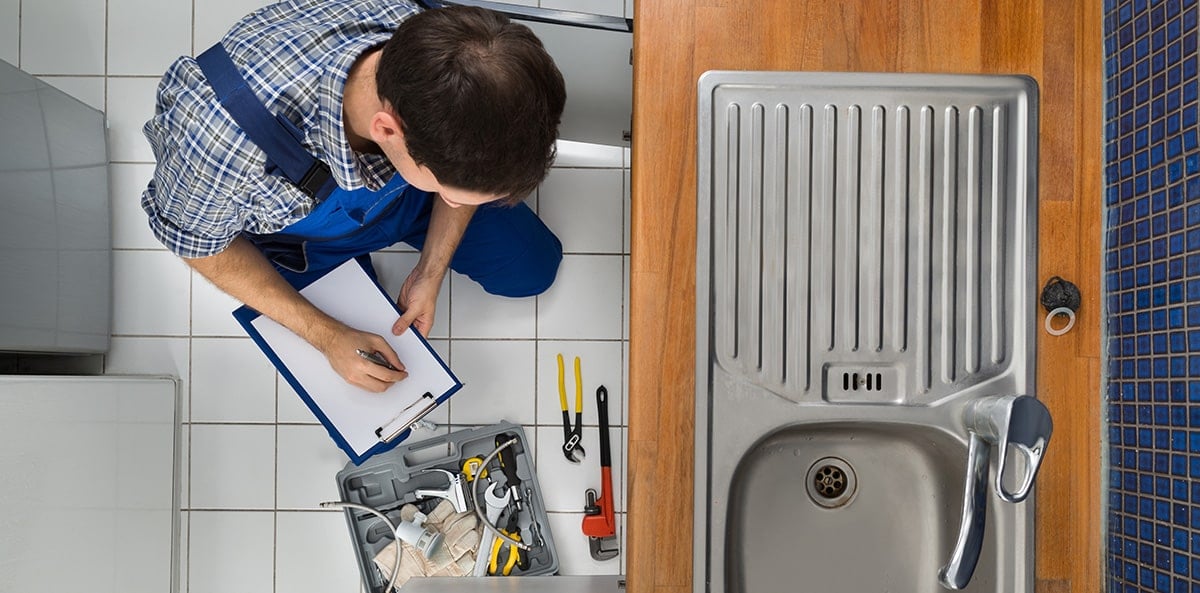How to successfully bid on plumbing jobs

Being good at your work is only one part of a successful plumbing business. You also need to bid on jobs to stay busy consistently.
Bidding for jobs refers to the process of estimating costs and submitting formal proposals. Your bids can make or break your business. If you underbid a project, you’ll work for little or no profit. On the other hand, a well-crafted bid demonstrates your professionalism, establishes clear expectations, and ensures you’re profitable.
To help you stand out from your competitors in the bidding process and win more projects, there are a few key steps you can follow to keep your plumbing business thriving.
- Understand what kind of plumbing job you're bidding on
- Properly scope the job
- Ask the important questions upfront
- Calculate costs accurately
- Prepare a competitive bid document
- Bid on the right jobs
- Find the best plumbing jobs
- Manage risks and requirements in plumbing contracts
- Follow up after submission
- Protect your plumbing business with insurance
- Consider how insurance premiums and risk controls can affect bids
- Key tips to remember for successful bidding on plumbing jobs
- Get the best insurance for your plumbing business with Insureon
Understand what kind of plumbing job you're bidding on
The first step in how to bid on plumbing jobs is to understand the type of work you’ll be doing. Every plumbing job is unique, and you’ll need to understand the details before bidding.
Most plumbing jobs can be divided into three categories:
New construction
These projects involve installing complete plumbing systems in new homes as they’re being built. They may also include homes with new additions or remodeling work. You'll need to work closely with on-site contractors, follow strict construction schedules, and adhere to blueprints and building codes.
Commercial plumbing
These projects involve retail stores and restaurants, or big jobs like hospitals and manufacturing facilities. Specialized knowledge of commercial codes, complex systems, and industrial materials and equipment is required.
Service, maintenance, and repairs
These jobs are the bread and butter of most plumbing businesses. Residential plumbing jobs are usually small, like tightening a leaky faucet, unclogging a drain, fixing a homeowner's do-it-yourself (DIY) mistake, and other routine maintenance.

Properly scope the job
To determine the scope of a job, you'll need to understand the details. Be sure to review the blueprints, plumbing plans, and code requirements. Also, visit the jobsite to inspect it. Walk the entire site and look for access points, check the existing conditions, and identify potential obstacles like tight crawl spaces.
Also, be sure to find out what's behind the walls or underneath the floors. A surprise discovered during construction could quickly turn a profitable project into a money loser.
Ask the important questions upfront
Preparing a detailed bid takes time, and having the right information is crucial to ensure your bid accurately reflects the project’s scope, total cost, and requirements.
Here are some important questions to ask upfront:
- Who is the general contractor? This lets you check out who you’ll be working with so you can see whether they’re reputable and pay on time.
- What’s the timeline? You’ll need to know when you’ll start, milestone dates, and how delays by other contractors could affect your schedule.
- What are the materials and labor specifications? The cost of materials, preferred brands, and special installation requirements must be included in your bid.
- Is a performance bond required? A performance bond protects the client if you fail to complete the work, while a permit bond ensures the work complies with local government regulations. If a business bond is required, the cost must be factored into your bid.
- Who secures the permits? Clarify whether obtaining permits and paying for them is your responsibility.
- What insurance requirements must you meet? You may be required to have certain insurance policies to protect the client, contractor, and others working on the project.
Many plumbing businesses focus on the cost of materials and labor in their bids, but the overhead costs can have a big impact on your profitability.
Calculate costs accurately
Perhaps one of the most important factors in bidding for plumbing jobs on new construction projects is accurately determining your costs. Every dollar you miscalculate—whether you underestimate expenses or forget items—reduces your profit.
Here are some important factors to consider:
Material costs
Create a detailed list of the materials you'll need and obtain firm quotes from multiple plumbing industry suppliers to ensure you get the best price. Don't forget to include anything extra you'll need, like hardware, trim pieces, special tools, or priority shipping.
Some suppliers may offer discounts for repeat business or bulk orders. Also, be sure you understand suppliers’ return policies in case you order more than you need, receive the wrong item, or something is defective.
Labor costs
Calculate labor costs for your crew based on the actual billable hours they’ll work plus payroll taxes, workers' compensation, and other insurance policies and benefits. Review previous jobs completed to estimate completion times and factor in the time needed for setup and cleanup.
Don't forget to include subcontractors and any support labor you'll need. Factor in realistic overtime costs if projects have tight deadlines or require weekend or after-hours work. If a project is outside your service area, you may also incur travel costs to get your crew and equipment to and from the jobsite.
Overhead
Many plumbing businesses focus on the cost of materials and labor in their bids, but the overhead costs can have a big impact on your profitability.
Don't forget to include these expenses in your plumbing services bids:
- Tools and equipment: Include the purchase price, maintenance, storage, and a reserve for their eventual replacement.
- Transportation: Include fuel, maintenance, insurance, and depreciation.
- Insurance, licensing, and permits: Know your annual costs for your business insurance policies, licensing requirements, bonds, and permits.
- Contingency costs and risk factors: Plan for the unexpected by adding 10% to 15% to your base costs to cover damage, delays, and other hidden risks.
- Profit margin: After covering all your costs, you'll need to add a markup of 10% to 25% so your business earns a profit.
Prepare a competitive bid document
First impressions matter. The next step in the process of bidding for plumbing jobs is to compile a well-structured plumbing estimate. A clear, thorough proposal not only sets you apart from competitors but also positions you as a trusted professional. Plumbing software typically has templates you can use.
Your bid should include these essentials:
- Scope of work: Be clear about what you'll do. Document the specific tasks you'll perform to prevent misunderstandings and disputes.
- Material and part specifications: List the specific brands and models you'll use so clients can compare bids and understand exactly what they’re getting.
- Timeline and project milestones: Provide start and finish dates so customers can plan around the work.
- Payment schedule: For larger jobs, a payment schedule reduces the risk of delayed or missed payments. You might request a 10% deposit, 40% after the rough-in inspection, 40% when fixtures are installed, and the final 10% upon completion.
- Warranties: State clearly what you guarantee and for how long.
Consider creating separate sections for "What's included" and "What's not included" in your bid. For example, if excavation is needed but you don't do that work, state "Excavation not included" so the client understands another contractor will be needed for that service.
Your bid should look as good as your plumbing work. It should be professional and easy to read. Avoid handwritten bids, and include a brief section that highlights your qualifications, master plumber certifications, and past work to demonstrate your experience and show why you're the right choice for the plumbing project.
Bid on the right jobs
To build a profitable plumbing business, you'll need a steady stream of jobs. The next step in how to bid on commercial plumbing jobs is knowing where to find the best opportunities.
Consider these proven sources:
General contractors
Building relationships with general contractors can lead to consistent work. Once you prove yourself reliable, contractors may call you directly instead of putting every job up for bid. You can get to know contractors in your area by attending local builder association meetings and introducing yourself at jobsites.
Plan rooms
Most cities have plan rooms where contractors can review projects and pick up bid documents. They’re a great way to get advance notice of projects and obtain specifications, so you’ll have plenty of time to prepare detailed bids. If there's a membership fee, it’ll likely pay for itself if you land just one decent-sized job.
Construction leads platforms
Online construction industry platforms list projects in your area that are open for bidding. They allow you to filter opportunities by trade, project size, and location to save time.
Local government and public works
Local government agencies often need plumbing work for new buildings and renovations. Be sure to find out how to get on their approved vendor list and learn their bidding procedures.
Bid invitation notices
Formal invitations to bid are required for most public projects. Be sure to check local newspapers and government websites for notices. You may also receive them by email if you’re on a contractor list.
Find the best plumbing jobs
The next step in securing plumbing contracts is to focus on finding work that matches your experience level, crew size, and equipment. It’s also worth establishing a defined service area to save on travel expenses and minimize time away from home.
Be sure to consider the timeline of each job and your risk tolerance. Make sure it fits your schedule and the risks are manageable. If there are risks—like the potential for surprises in an old building—be sure to price them into your bid.
Not every plumbing job will be worth your time, and that's okay. Consider passing on jobs with unrealistic budgets, impossible timelines, or jobs you don't feel entirely comfortable with. On the other hand, consider bidding aggressively when there isn't much competition or when a contractor reaches out to you directly.
Manage risks and requirements in plumbing contracts
Once you've landed a job, you’ll need a contract to protect your business. Be sure to include as much detail as possible to prevent surprises and disputes down the road.
Here are some essentials your contract should include:
- Insurance: Specify the policies you carry and any coverage the customer is required to maintain, like commercial property insurance or homeowners' insurance.
- Liability: State who’s responsible for any problems that may arise. For example, removing an old water heater might uncover rotted subflooring that must be repaired.
- Change orders: Establish a process for handling work that's not part of the original project. This ensures you’re compensated for additional work when customers change their minds about materials or request extra features.
- Dispute resolution: Include a clause requiring arbitration before either party can file a lawsuit to save time and money when disagreements arise. Also specify which state's laws govern the contract and where disputes must be resolved.
- Site safety: Define safety responsibilities and site access requirements. Specify that the customer must inform you of known hazards like asbestos or lead paint, and that you can stop working on the project if unsafe conditions develop.
- Subcontractors: If you plan to use subcontractors, disclose it upfront.
Before signing any contract, verify that you have sufficient insurance coverage and that your licenses are current. If your current policies are insufficient, contact your agent to increase your coverage limits or add umbrella policies.
Also, make sure to include clauses in your contract for unforeseen issues. A "concealed conditions" clause addresses what happens when you encounter unexpected problems, like rotted frames, obsolete fittings, or code violations in existing work. Additionally, a warranty distinguishes between problems with your work and normal wear and tear or other damage.

Follow up after submission
After you submit your bid, follow up after a few days to confirm they received it and see if anything needs to be clarified. Review any addenda the client adds to the contract to make sure you agree to them. Also, attend the site walk-through to ensure there are no surprises and to get any questions you may have answered.
Your customer may want to negotiate some things in the contract. For example, they may ask for a materials change, cutback, or price reduction. If this happens, look for ways to reduce costs without compromising quality. If you’re pressed for a significant price reduction, consider offering to do less work instead of doing the same job for less money.
Every job you complete is an opportunity to build your reputation and generate future business. When bidding, be sure to reference past projects and include photos and professional references. If you win a job, be sure to do high-quality work and meet all deadlines. Satisfied customers can be your best marketing tool. They can lead to referrals and repeat business.
Protect your plumbing business with insurance
Having comprehensive insurance coverage isn't just about protecting your business. It can help you qualify for work. Many governments and contractors won't even consider your bid without proof of insurance, bonds, and licensing.
Essential coverage you’ll need includes:
- General liability insurance for contractors covers third-party injury and property damage, like water damage during an installation. A business owner’s policy (BOP) bundles this coverage with commercial property insurance and business interruption insurance at a lower cost than buying the policies separately.
- Professional liability insurance protects you from claims involving errors or omissions in your work. This coverage is essential if plans or designs are involved.
- Commercial auto insurance covers your work vehicles while traveling to and from job sites. Personal auto policies typically don't cover business use of vehicles.
- Workers’ compensation insurance is required by law in most states if you have employees. It covers medical bills and lost wages for workplace injuries, like struck-by-object accidents and others.
- Tools and equipment insurance protects your tools and other equipment against theft or loss.
- Contractor's pollution liability insurance addresses risks from fuel spills, hydraulic fluid leaks, and other environmental hazards that can trigger expensive environmental cleanups and claims.
- Surety bonds guarantee you'll complete the work as agreed. They’re often required for public or commercial projects.
Your insurance costs affect every bid you submit. If your insurance costs are low and you have good risk management practices, you can bid more aggressively while maintaining the same profit margins.
Insurance companies may offer discounts for contractors with:
- Safe work practices
- Formal training programs
- Professional certifications
- Site safety precautions
To reduce your insurance costs, consider bundling policies with the same provider when possible. Also, consider providing regular safety training and keeping all equipment in good working order.
Key tips to remember for successful bidding on plumbing jobs
Winning jobs by underpricing may keep you busy, but it won’t keep you in business. Every bid you submit should include a healthy profit margin to ensure you’re compensated.
Building relationships with contractors, suppliers, and customers is also essential for long-term success. Always deliver exceptional work and communicate clearly. A contractor who knows you'll show up on time, do quality work, and handle problems professionally will often choose your bid over a cheaper bid from a plumber they don't know or trust.
Finally, always protect yourself with a well-written contract. It should clearly define the scope, payment terms, and procedures for handling changes or disputes. Maintaining proper insurance coverage is also essential. It doesn't just protect your business—it's also necessary to qualify for commercial and government projects that require proof of coverage.
Get the best insurance for your plumbing business with Insureon
It's easy to get insurance for your small business with Insureon. Just fill out our online application to receive quotes from trusted providers. Our expert insurance agents are available to answer any questions and help you find the best affordable construction and contracting business insurance that matches your needs.
Most small business owners can get same-day coverage and easily download a certificate of liability insurance (COI) as soon as they purchase a policy.
Cyrus Vanover, Contributing Writer
Cyrus is a finance and insurance writer who is passionate about helping people and businesses succeed. He is also the author of the book "Earn a Debt-Free College Degree." He has written for some of the largest financial institutions in the country including TD Bank, Citizens Bank, and many credit unions. Cyrus has also contributed to Newsweek. Based in the Blue Ridge Mountains of Virginia, he enjoys hiking the local trails and exploring old Civil War battlefields and other historical sites in his spare time.









